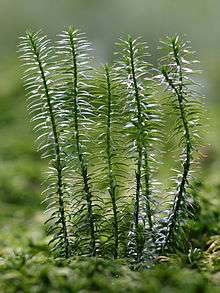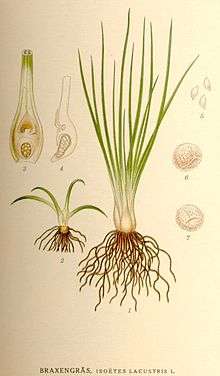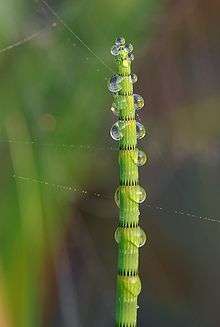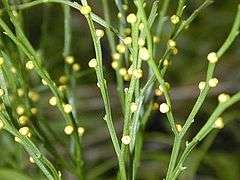Fern ally
Fern allies are a diverse group of seedless vascular plants that are not true ferns. Like ferns, a fern ally disperses by shedding spores to initiate an alternation of generations.




Classification
Originally, three or four groups of plants were considered to be fern allies. In various classification schemes, these may be grouped as classes or divisions within the plant kingdom. Fern allies and ferns were sometimes grouped together as division Pteridophyta.[1] Another traditional classification scheme of living plants is as follows (here, the first three classes are the "fern allies"):
- Kingdom: Plantae
- Division Tracheophyta (vascular plants)
- Class Lycopsida, clubmosses and related plants (fern-allies)
- Class Sphenopsida or Equisetopsida, horsetails and scouring-rushes (fern-allies)
- Class Psilopsida, whisk ferns (fern-allies)
- Class Filices or Pteropsida, true ferns
- Class Spermatopsida (or sometimes as several different classes of seed-bearing plants)
- Division Tracheophyta (vascular plants)
More recent evidence shows that the class Filices, as described above, is not monophyletic. The following classification represents a consensus view (although different authors may use different names for the various groups):[2]
- Kingdom Plantae
Subkingdom Tracheobionta- Division Lycopodiophyta
- Class Lycopodiopsida, clubmosses
- Class Selaginellopsida, spikemosses
- Class Isoetopsida, quillworts and scale trees
- Division Pteridophyta
- Class Equisetopsida, horsetails and scouring-rushes
- Class Psilotopsida, whisk ferns, adders'-tongues and moonworts
- Class Marattiopsida, marattioid ferns
- Class Pteridopsida, leptosporangiate ferns (also called Polypodiopsida or Filicopsida)
- Division Spermatophyta (or as several different divisions of seed-bearing plants)
- Division Lycopodiophyta
Note that in either scheme, the same basic groups are recognized (Lycopodiophyta, Equisetopsida, Psilotopsida), but in the most recent scheme only the Lycopodiophyta is not classified with the ferns.
Relationships
Another way of looking at this relationship is as follows. Several groups of plants were considered "fern allies": the clubmosses, spikemosses, and quillworts in the Lycopodiophyta, the whisk ferns in Psilotaceae, and the horsetails in the Equisetaceae. Traditionally, three discrete groups of plants had been considered ferns: the adders-tongues, moonworts, and grape-ferns (Ophioglossales), the Marattiaceae, and the leptosporangiate ferns. More recent genetic studies have shown that the Lycopodiophyta are only distantly related to any other vascular plants, having radiated evolutionarily at the base of the vascular plant clade, while both the whisk ferns and horsetails are as much true ferns as are the Ophioglossoids and Marattiaceae. The Marattiaceae are a group of tropical ferns with a large, fleshy rhizome, and are now thought to be a sister group to the main group of ferns, the leptosporangiate ferns. The whisk ferns and Ophioglossids are demonstrably a clade, however, the relationships between these this group, the leptosporangiate ferns+marattiaceae, and the horsetails remains uncertain.
References
- Sporne, K.R. (1966), The Morphology of Pteridophytes (2nd ed.), London: Hutchinson, ISBN 978-0-09-104881-5
- Pryer, K. M., Schuettpelz, E., Wolf, P. G., Schneider, H., Smith, A. R. & Cranfill, R. (2004), "Phylogeny and evolution of ferns (monilophytes) with a focus on the early leptosporangiate divergences", American Journal of Botany, 91 (10): 1582–1598, doi:10.3732/ajb.91.10.1582, PMID 21652310CS1 maint: multiple names: authors list (link)
External links
- Common Ferns and Fern-Ally Species
- A Classification of the Ferns and Fern-Allies (uses frames)
- Non-seed plant images at bioimages.vanderbilt.edu
- Lord, Thomas R. (2006). Ferns and Fern Allies of Pennsylvania. Indiana, PA: Pinelands Press